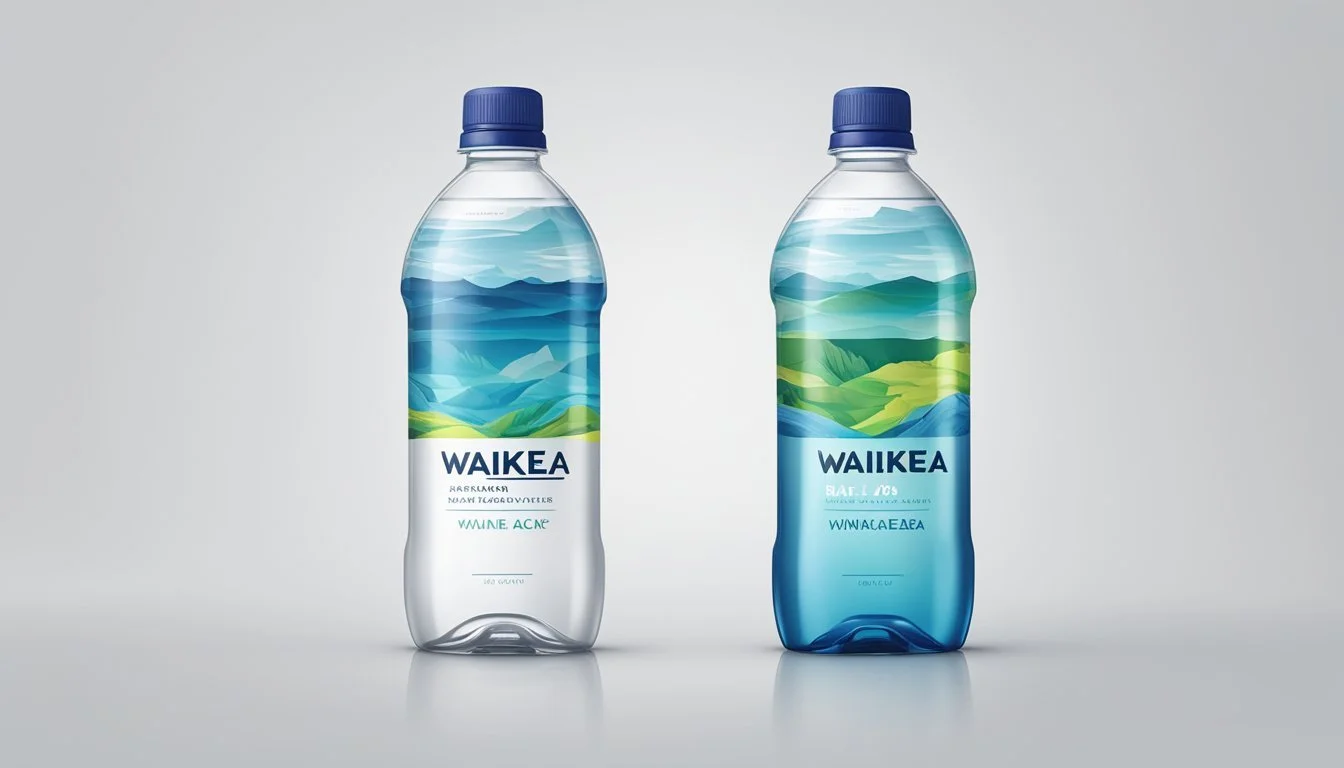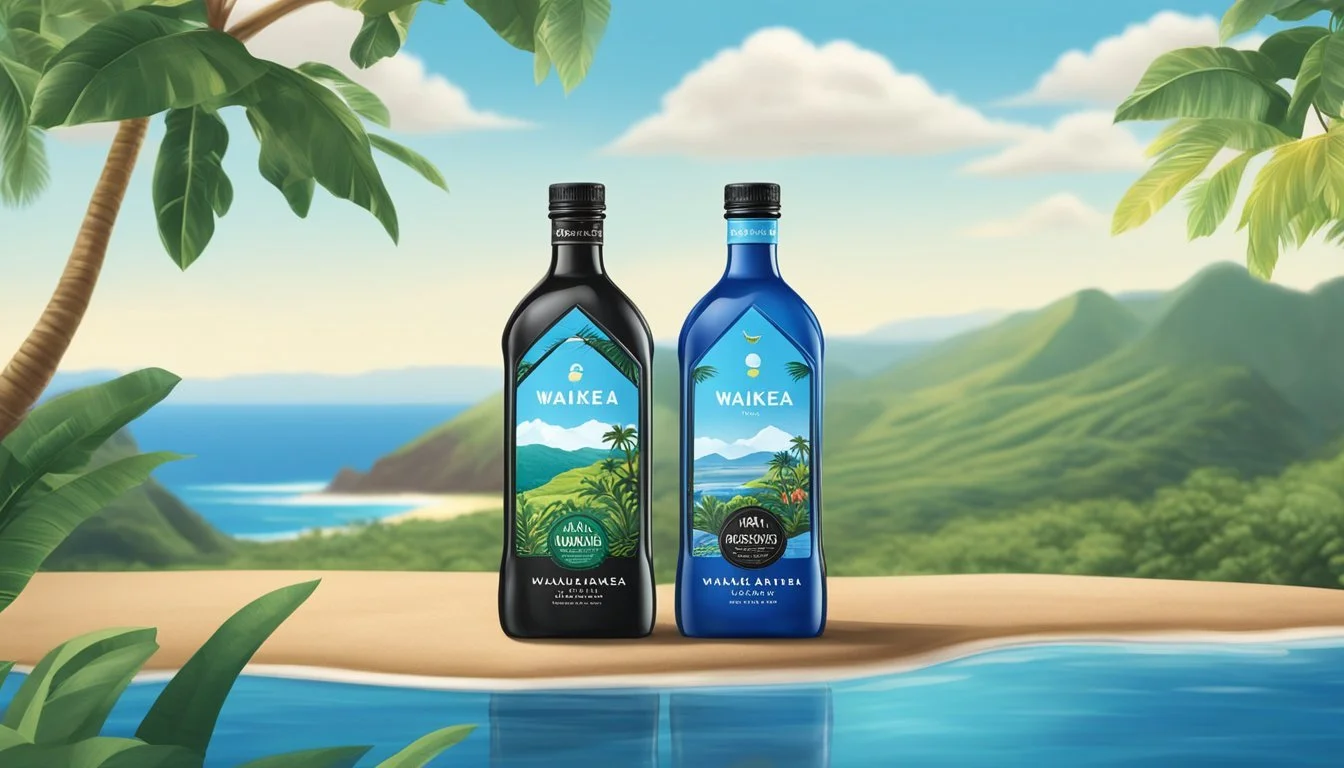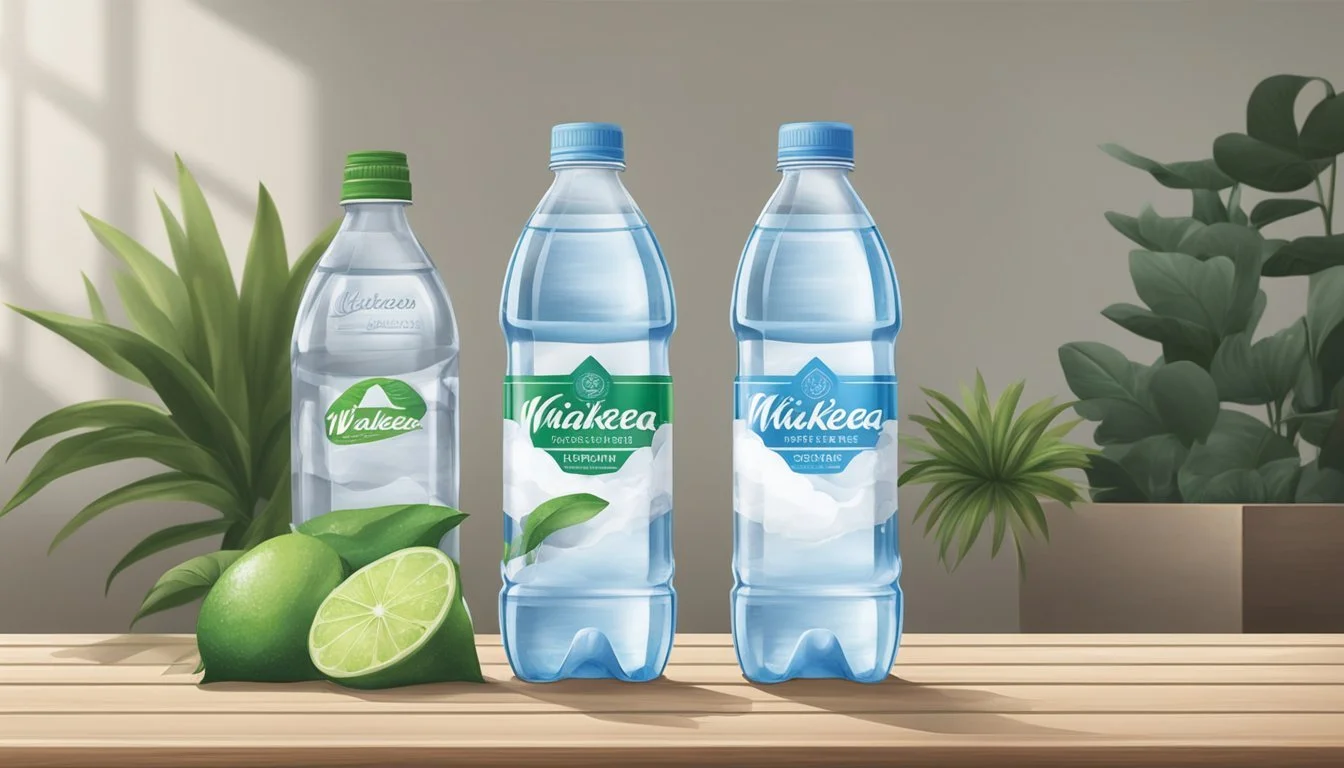Waiakea vs. Blk
Comparing Premium Bottled Waters
Choosing the best bottled water can be daunting, especially with so many brands claiming various health benefits and unique features. Waiakea stands out with its naturally alkaline pH level of 8.8, which helps neutralize body acidity and supports vital functions. This Hawaiian brand emphasizes sustainability as the first US bottled water to be certified Carbon Neutral and donates a portion of revenue to global nonprofits.
On the other hand, Blk water offers a distinct proposition with its fulvic-enhanced mineral-rich black water. Known for its detoxifying properties, Blk water proposes an unconventional but intriguing approach to hydration. Its distinctive appearance and purported health benefits make it a popular choice for those seeking an alternative to traditional bottled water.
By comparing these two brands—Waiakea's alkaline and eco-friendly focus with Blk's unique fulvic infusion—readers can make an informed decision on which meets their hydration and health preferences best.
Comparing Water Sources
Understanding where Waiakea and Blk source their water reveals significant differences in origin and natural filtration processes. These factors play a crucial role in determining the water's purity, taste, and health benefits.
Sourcing and Origin
Waiakea sources its water from the Mauna Loa Volcano in Hawaii. The water originates from snowmelt and rain that filter through 14,000 feet of volcanic rock. This natural filtration process enriches Waiakea water with minerals and results in a naturally alkaline pH of 8.8. The composition of the water reflects its unique volcanic origin.
Blk sets itself apart by infusing purified water with fulvic trace minerals obtained from ancient peatlands. These minerals give the water its distinctive black color. The water itself is sourced from various natural springs and groundwater locations. The focus here is on the added minerals rather than the source of the water.
Natural Filtration Processes
Waiakea’s natural filtration process involves water passing through porous volcanic rock. This journey removes impurities and infuses the water with essential minerals like calcium, magnesium, and silica. This extensive filtration ensures a clean, pure, and naturally alkalized water, contributing to its distinct taste and health benefits.
Blk’s filtration processes differ in that the water undergoes purification before being infused with fulvic trace minerals. These minerals, revered for their potential health benefits, saturate the water, providing electrolytes and enhancing hydration. However, the base water itself does not undergo as elaborate a natural filtration process as Waiakea, emphasizing the added mineral content over natural sourcing.
Water Quality and Composition
When comparing Waiakea and Blk bottled water, examining their water quality and composition is crucial. Consider factors like pH levels, mineral content, and potential contaminants to determine which water is better suited for consumption.
PH Levels and Alkalinity
Waiakea boasts a naturally alkaline pH of 8.2, which can help neutralize stomach acidity and promote optimal hydration. Its alkaline nature is a result of filtering through volcanic rock.
Blk water has a neutral pH ranging between 7.0 and 8.0. It is infused with fulvic minerals, which may slightly alter its pH. Alkaline water is believed to balance body pH and enhance metabolic functions.
Here’s a comparison in table form:
Brand pH Level Alkalinity Waiakea 8.2 Naturally alkaline Blk 7.0-8.0 Neutral to slightly alkaline
Mineral Content Analysis
Waiakea contains essential minerals like calcium, potassium, magnesium, and silica. These minerals contribute to both taste and health benefits. For example:
Calcium and magnesium support bone health.
Silica promotes skin and hair health.
Blk water is infused with fulvic minerals, which boast over 77 trace minerals. These include electrolytes, important for hydration and muscle function. However, the exact mineral content may vary batch to batch.
Key minerals in each:
Waiakea: Calcium, Magnesium, Potassium, Silica
Blk: Fulvic minerals, a mix of 77+ trace minerals
Presence of Contaminants
Both brands ensure high standards to avoid contaminants. Waiakea water passes through natural volcanic rock filtration, removing harmful substances while retaining beneficial minerals.
Third-party tests show Blk water is free from contaminants, but the black color from fulvic minerals might be off-putting for some. Testing ensures it lacks chlorine, heavy metals, and arsenic.
Quality checks:
Waiakea: Natural filtration.
Blk: Third-party purity tests.
Both Waiakea and Blk prioritize purity, ensuring contaminant-free products suitable for everyday hydration.
Health and Hydration Benefits
Choosing the right bottled water involves looking at hydration efficiency and the health impact of minerals and pH levels. Waiakea and Blk both offer distinct advantages that cater to different aspects of health and hydration.
Hydration Efficiency
Hydration is essential for maintaining bodily functions and overall well-being. Waiakea water, sourced from Hawaiian volcanoes, boasts a naturally alkaline pH of 8.8.
This alkalinity helps neutralize body acidity, promoting better hydration. The presence of electrolytes such as calcium, magnesium, and potassium further supports hydration by replenishing essential minerals lost through sweat and other bodily functions.
Blk water, on the other hand, is infused with fulvic acid, which gives it its characteristic black color. Fulvic acid's small molecular size aids in quick absorption, potentially improving hydration speed. However, it lacks the naturally occurring balanced electrolytes found in Waiakea.
Health Impact of Minerals and PH
Waiakea's mineral content is beneficial for health. It is rich in silica, which promotes bone health and supports connective tissues. The water also contains essential minerals like calcium and magnesium, which are crucial for muscle function and cardiovascular health.
Blk water contains fulvic acid, which is believed to aid in nutrient transport and detoxification. While the health benefits of fulvic acid are still being studied, some users report improved energy levels and digestive health.
Waiakea's natural alkalinity may aid in balancing the body's pH, potentially reducing symptoms of acid reflux and improving overall digestion. Blk's neutral pH means it doesn't offer the same alkalinity benefits, focusing instead on the detoxifying properties of fulvic acid.
Both waters offer unique health advantages, but the choice ultimately depends on individual health needs and preferences.
Taste and Sensory Experience
When comparing Waiakea and Blk bottled waters, examining their flavor profiles and the mouthfeel they provide helps to understand what sets them apart for consumers. Each brand offers a unique sensory experience influenced by their distinct mineral compositions and sources.
Flavor Profiles
Waiakea water is sourced from volcanic rocks in Hawaii, which lend it a slightly sweet taste due to its naturally high alkaline pH of 7.6 to 8.2. This subtle sweetness is complemented by the presence of electrolytes and essential minerals.
Blk water, on the other hand, has an intriguing taste profile influenced by its fulvic acid content. This component gives Blk water its signature dark color. The flavor is more neutral compared to Waiakea, with some consumers noting a mild, mineral-like taste that can be attributed to the fulvic minerals.
Mouthfeel and Refreshment
Waiakea's high alkalinity also contributes to a smooth and silky mouthfeel. This characteristic brings a refreshing quality that many consumers find appealing, making it a favored choice for drinking on the go.
Blk water’s mouthfeel is unique due to its fulvic acid content. The water feels slightly dense, yet refreshingly neutral, offering a distinct drinking experience that can be either intriguing or off-putting depending on personal preference. The trace minerals present in Blk water also play a role in this sensation, enhancing its unique character.
Environmental and Sustainability Considerations
Waiakea and Blk approach environmental and sustainability efforts with distinct strategies. These aspects cover their bottling and packaging practices, as well as their broader sustainability commitments.
Bottling and Packaging Impact
Waiakea uses 100% recycled PET (rPET) bottles, which significantly reduce the environmental footprint. These bottles use 85% less energy and 99% less water to produce compared to virgin plastic. This approach reduces carbon emissions by 79%.
Blk, on the other hand, employs standard plastic bottles, which are less eco-friendly. Though efforts are being made to transition to more sustainable materials, they do not yet match Waiakea's advanced use of rPET.
Sustainability Practices of Brands
Waiakea is a Carbon Neutral certified company and donates over 5% of its revenue to nonprofits in Hawaii and globally. They source water from volcanic springs and operate with 100% renewable energy, emphasizing their commitment to environmental sustainability.
Blk focuses on supporting wellness and community initiatives but lacks specific sustainability certifications or a notable carbon reduction plan. Their efforts in this area are ongoing, aiming to align more closely with eco-friendly practices seen in the industry.
Brand Philosophies and Commitments
Both Waiakea and Blk emphasize sustainability and social responsibility, but their approaches differ significantly.
Environmental Stewardship
Waiakea is committed to sustainability through multiple initiatives. It was the first U.S. bottled water to achieve Carbon Neutral certification, which means they offset the carbon emissions from their production process. They use 100% recycled polyethylene terephthalate (rPET) for their bottles, significantly reducing plastic waste. The company also focuses on sustainable sourcing, drawing its water from Hawaiian volcanic wells. This natural filtration through volcanic rock is eco-friendly and ensures high water purity.
Blk also prioritizes environmental sustainability. Their packaging is designed to be recyclable, and they engage in efforts to reduce their carbon footprint during the manufacturing and distribution processes. Unlike Waiakea, Blk focuses more on the minimalistic and efficient use of resources, minimizing their impact on the environment. Their black-colored bottles are made from eco-friendly materials, but information on specific sustainability certifications like Carbon Neutrality is less emphasized.
Community and Social Responsibility
Waiakea donates over 5% of its revenue to various nonprofits, particularly focusing on initiatives in Hawaii and global water projects. They also emphasize ethical business practices, ensuring fair wages and supporting local communities. In alignment with their mission, Waiakea has implemented programs to provide clean water to underprivileged regions, reinforcing their commitment to both social justice and health.
Blk engages in community outreach through partnerships and sponsorships that often support sports, health, and wellness initiatives. Though their social responsibility efforts are less detailed than Waiakea's, they do contribute to local communities by supporting events and charitable causes. Their focus tends more towards health and lifestyle improvements, reflecting their brand's image and mission.
Both brands demonstrate clear commitments to supporting their communities and promoting sustainability, yet they do so with distinct approaches and areas of focus.
Production and Purification Methods
Both Waiakea and Blk leverage distinct production and purification methods to ensure the highest quality for their consumers. This section delves into the specific processes they use, focusing on filtration, purification, and advanced techniques like distillation and reverse osmosis.
Filtration and Purification Processes
Waiakea sources its water from the base of Mauna Loa volcano, utilizing natural filtration through porous volcanic rock. This enhances the water with minerals and electrolytes, making it naturally alkaline.
Additionally, Waiakea’s purification process includes deep-well injection and microfiltration to maintain purity while retaining its mineral-rich composition.
On the other hand, Blk distinguishes itself with black water infused with fulvic trace minerals. The water undergoes a stringent purification process to remove impurities before blending with fulvic minerals.
This step ensures the water remains clear despite the infusion, highlighting the brand’s focus on purity and mineral content.
Distillation and Reverse Osmosis
Distillation and reverse osmosis are advanced methods used to ensure the highest standards of water purity.
Waiakea does not typically rely on distillation or reverse osmosis, given its natural filtration through volcanic rock. However, they do use supplementary microfiltration techniques to enhance the purity without stripping away essential minerals.
Blk employs reverse osmosis to achieve high levels of purification. This process forces water through a semipermeable membrane, removing contaminants and providing a clean base for the infusion of fulvic trace minerals.
While Waiakea focuses on maintaining its natural mineral content, Blk ensures its water is both pure and enriched with beneficial minerals through modern purification techniques.
Comparative Analysis
Waiakea and Blk are unique in their sources and the added benefits they offer. By examining cost, value, market reach, and availability, one can make an informed choice between these two brands.
Cost and Value Considerations
Waiakea water, sourced from Hawaiian volcanic rock, boasts natural alkalinity and mineral content. A typical 500ml bottle is priced around $2-$3, reflecting the premium quality and health benefits such as its alkalinity level of 8.8.
Blk water, infused with fulvic minerals that give it a distinct black color, generally costs about $2-$3 per 500ml bottle as well. The high price tag stems from its unique mineral composition, wellness claims, and novelty factor.
While both brands are priced at the premium end, Waiakea emphasizes environmental responsibility with recyclable packaging, adding value for eco-conscious consumers. Blk's value lies in its distinctive appearance and wellness proposition, appealing to those looking for something different in bottled water options.
Market Presence and Availability
Waiakea enjoys widespread availability, especially in health food stores and online platforms. Its strong market presence is bolstered by its branding as a health-conscious and environmentally friendly choice, which resonates well with a broad consumer base.
Blk water, while also available online and in stores, has a more niche market presence. It tends to appeal to consumers intrigued by its unique black color and associated health claims. This specialized appeal has led to a solid, if smaller, market presence.
In terms of distribution, Waiakea benefits from partnerships with major retailers and an international reach. Blk, though smaller in scale, maintains a strong online presence and targeted retail partnerships, ensuring it remains accessible to its core audience.
Consumer Considerations and Conclusion
When selecting between Waiakea and Blk bottled waters, consumers should weigh factors such as convenience, lifestyle needs, and personal preferences. Recommendations will focus on these important aspects.
Convenience and Lifestyle Factors
Consumers often look for convenience in bottled water. Waiakea water is available in a variety of sizes, making it easy to find a bottle that fits in a backpack or gym bag. Waiakea boasts a naturally high alkaline pH, beneficial for those attentive to their dietary choices.
Blk water, with its unique black color due to fulvic trace minerals, can be a conversation starter or fit specific dietary needs. It's not as widely available as Waiakea but has a unique niche market appeal.
For those with active lifestyles, Waiakea's recyclable packaging and commitment to sustainability can be an attractive feature. Meanwhile, Blk caters to those intrigued by novelty and potential health benefits offered by fulvic minerals. Availability in local stores or online may also impact personal preference in selecting between these two brands.
Final Recommendations
Choosing between Waiakea and Blk comes down to individual needs. Waiakea is recommended for those prioritizing sustainable practices and a consistently high pH level. Its wider availability makes it a practical option for everyday hydration.
Blk water, with its distinctive appearance, offers a different kind of appeal. It’s suited for those who are open to experimenting with new health trends and want to explore the benefits of fulvic minerals. Its unique properties may align with specific health or dietary goals.
In conclusion, both bottled waters offer unique features that can fit various consumer lifestyles and preferences. The final choice should reflect personal values and individual hydration needs.
More ABout Waiakea
Icelandic Glacial vs Waiakea: Which Bottled Water is Better?
Mountain Valley Spring Water vs Waiakea: Which Bottled Water is Better?
Waiakea vs Kirkland Signature: Which Bottled Water is Better?
Waiakea vs Richard's Rainwater: Which Bottled Water is Better?
Waiakea vs Whole Foods Italian Still Mineral water: Which Bottled Water is Better?






